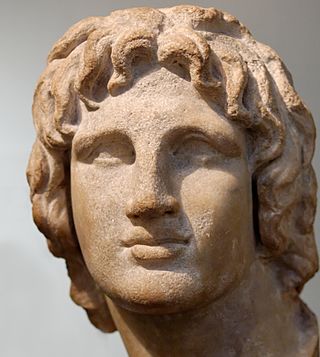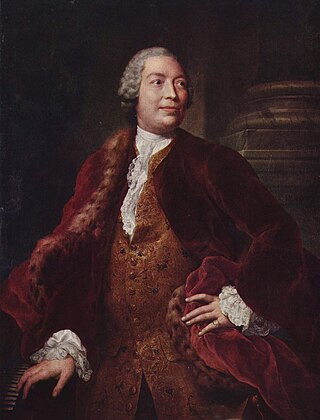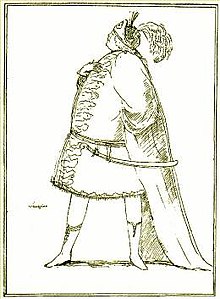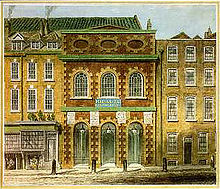
Rodelinda, regina de' Longobardi is an opera seria in three acts composed for the first Royal Academy of Music by George Frideric Handel. The libretto is by Nicola Francesco Haym, based on an earlier libretto by Antonio Salvi. Rodelinda has long been regarded as one of Handel's greatest works.

Flavio, re de' Longobardi is an opera seria in three acts by George Frideric Handel. The Italian-language libretto was by Nicola Francesco Haym, after Matteo Noris's Flavio Cuniberto. It was Handel's fourth full-length opera for the Royal Academy of Music. Handel had originally entitled the opera after the character of Emilia in the opera.

Alessandro, is an opera composed by George Frideric Handel in 1726 for the Royal Academy of Music. Paolo Rolli's libretto is based on the story of Ortensio Mauro's La superbia d'Alessandro. This was the first time the famous singers Faustina Bordoni and Francesca Cuzzoni appeared together in one of Handel's operas. The original cast also included Francesco Bernardi who was known as Senesino.

Atalanta is a pastoral opera in three acts by George Frideric Handel composed in 1736. It is based upon the mythological female athlete, Atalanta, the libretto being derived from the book La Caccia in Etolia by Belisario Valeriani. The identity of the librettist is not known.

Riccardo primo, re d'Inghilterra is an opera seria in three acts written by George Frideric Handel for the Royal Academy of Music (1719). The Italian-language libretto was by Paolo Antonio Rolli, after Francesco Briani's Isacio tiranno, set by Antonio Lotti in 1710. Handel wrote the work for the Royal Academy's 1726–27 opera season, and also as homage to the newly crowned George II and the nation where Handel had just received citizenship.

Scipione, also called Publio Cornelio Scipione, is an opera seria in three acts, with music composed by George Frideric Handel for the Royal Academy of Music in 1726. The librettist was Paolo Antonio Rolli. Handel composed Scipione whilst in the middle of writing Alessandro. It is based on the life of the Roman general Scipio Africanus. Its slow march is the regimental march of the Grenadier Guards and is known for being played at London Metropolitan Police passing out ceremonies.

Tolomeo, re d'Egitto is an opera seria in three acts by George Frideric Handel to an Italian text by Nicola Francesco Haym, adapted from Carlo Sigismondo Capece's Tolomeo et Alessandro. It was Handel's 13th and last opera for the Royal Academy of Music (1719) and was also the last of the operas he composed for the triumvirate of internationally renowned singers, the castrato Senesino and the sopranos Francesca Cuzzoni and Faustina Bordoni.

Sosarme, re di Media is an opera by George Frideric Handel written in 1732 for the King's Theatre in the Haymarket, London, where it ran for 12 performances. The text was based on an earlier libretto by Antonio Salvi, Dionisio, Re di Portogallo, and adapted by an unknown writer. The original setting of Portugal was changed to Sardis in Lydia.

Ottone, re di Germania is an opera by George Frideric Handel, to an Italian–language libretto adapted by Nicola Francesco Haym from the libretto by Stefano Benedetto Pallavicino for Antonio Lotti's opera Teofane. It was the first new opera written for the Royal Academy of Music (1719)'s fourth season and had its first performance on 12 January 1723 at the King's Theatre, Haymarket in London. Handel had assembled a cast of operatic superstars for this season and the opera became an enormous success.

Arianna in Creta is an opera seria in three acts by George Frideric Handel. The Italian-language libretto was adapted by Francis Colman from Pietro Pariati's Arianna e Teseo, a text previously set by Nicola Porpora in 1727 and Leonardo Leo in 1729.

Giove in Argo is an Italian opera by George Frideric Handel. It is one of Handel's three pasticcio works made up of music and arias from his previous operas. The libretto was written by Antonio Maria Lucchini. The opera was first performed at the King's Theatre, Haymarket, London, on 1 May 1739.

Alessandro nelle Indie is an opera seria in two acts by Giovanni Pacini to a libretto by Andrea Leone Tottola and Giovanni Schmidt, based on Alessandro nell'Indie by Pietro Metastasio. It was premiered at the Teatro di San Carlo in Naples on 29 September 1824, and had a total of 38 performances in its first season.

Esther is an oratorio by George Frideric Handel. It is generally acknowledged to be the first English oratorio. Handel set a libretto after the Old Testament drama by Jean Racine. The work was originally composed in 1718, but was heavily revised into a full oratorio in 1732.

Antonio Montagnana was an Italian bass of the 18th-century who is best remembered for his association with the composer George Frideric Handel, in whose operas Montagnana sang.

Antonia Margherita Merighi was an Italian contralto active between 1703 and 1744 and known for her performances in operas by George Frideric Handel.

The Royal Academy of Music was a company founded in February 1719, during George Frideric Handel's residence at Cannons, by a group of aristocrats to secure themselves a constant supply of opera seria. It is not connected to the London conservatoire with the same name, which was founded in 1822.

Domenico Annibali was an Italian castrato who had an active international career from 1725–1764. He began his career in his native country and was then committed to the Grosses Königliches Opernhaus in Dresden from 1729 until his retirement from the stage 35 years later. In Dresden he excelled in the operas of Johann Adolph Hasse, notably creating roles in the premieres of two of his operas. He was also admired there in works by Nicola Porpora.

Cleofide (Cleophis) is an opera seria in three acts by Johann Adolf Hasse. The Italian libretto was adapted from Metastasio's Alessandro nell'Indie by Michelangelo Boccardi.

Admeto, re di Tessaglia is a three-act opera written for the Royal Academy of Music with music composed by George Frideric Handel to an Italian-language libretto prepared by Nicola Francesco Haym. The story is partly based on Euripides' Alcestis. The opera's first performance was at the Haymarket Theatre in London on 31 January 1727. The original cast included Faustina Bordoni as Alcestis and Francesca Cuzzoni as Antigona, as Admeto was the second of the five operas that Handel composed to feature specifically these two prime donne of the day.

Alessandro nell'Indie is a libretto in three acts by Pietro Metastasio. It was set to music around ninety times firstly by Leonardo Vinci, whose version premiered in Rome on 2 January 1730. The libretto was the fourth of five that Metastasio wrote for the Teatro delle Dame in Rome between 1727 and 1730. The work was dedicated to the Stuart pretender to the British throne, James Francis Edward Stuart, then resident in Rome.















